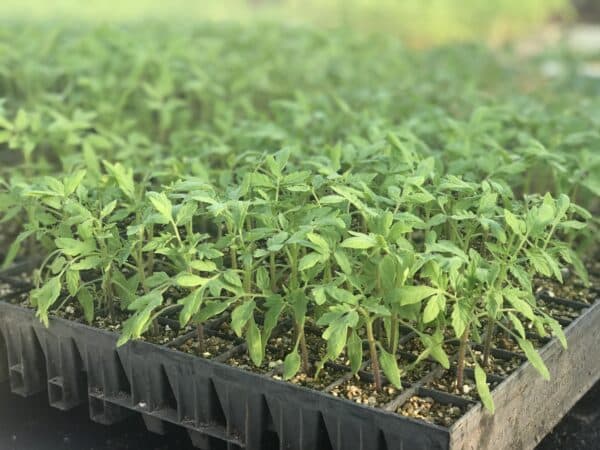
If you’re a seasoned local foodie you probably know the names of certain varieties of vegetables you like. Peaches and Cream sweet corn and Black Krim or Green Zebra tomatoes, for example, are some varieties that taste awesome. On our end, we want to plant the varieties you love, but we take many factors into account, like hardiness, disease resistance, yield potential, appearance and organic availability. But ultimately, flavor and nutrition are what it is all about.
The first planting decisions were made long ago. No genetically engineered seeds or plant material will ever cross the Elmwood Stock Farm cattle guard on the UPS truck that delivers shipments to our packing shed. That cuts out lots of sweet corn, potato, and squash varieties that are available to other farmers.
Organic farmers are required to use certified-organic seeds and plant materials (which are always GMO-free). This rule made it difficult to source the varieties we wanted in the early days but it also spurred many farmers to become organic seed growers to meet the demand that the rule created. Now there are several seed companies that specialize in offering high-quality, organic seeds in the varieties that market farmers like us are looking for. Johnny’s Selected Seeds, High Mowing Organic Seeds and Seedway are three sources we go to first. Some crops, like broccoli, have limited organic-seed availability, which we have to live with. There are specialty potato, ginger and sweet potato growers that we buy from directly.
Every year, we start with varieties we are familiar with as the basis of our production for the year. Many are names you are not familiar with but they are tasty and meet the production attributes we are looking for: good germinators, sturdy stems, resistance to fungal spores, etc. Husk coverage is important to produce clean organic corn. Good foliage canopy is important to protect peppers from the scalding rays of the sun. Cold tolerance is important for spinach and lettuce for our fall-winter-spring production period. Some squash varieties just can’t take the heat of summer. We scour various university websites and several trade publications evaluating variety trials which rate these attributes as well as yield potential.
We also experiment with new varieties in hopes of finding one that grows and yields well and tastes great. We learn about varieties that our farmer friends have tried and liked, too. Remember the cranberry potatoes we had years back? Customers loved them, but they are low yielders, which equates to a high cost of production. Same for Yukon Gold potatoes, so we grow Yukon Gem potatoes instead. The hard neck garlic we have most of the year is called “Little old lady from the farmers market garlic,” or just “little old lady” for short, because a little old lady customer of ours at the Lexington Farmers Market brought us some because she liked it so much. We divided the cloves, planted them, saved them back and propagated them out a few years so now we grow enough for all our CSA members and market customers. It is not only tasty, but has the practical attributes of sturdy, good cold tolerance, good husk coverage over the bulb, etc.
We save some of our own seeds from year to year, but that can be tricky too. If seeds are not properly harvested and stored, the germination rate may be low. Seed size and shape can be quite variable on some crops like corn. Look closely the next time you have an ear of corn. The kernels at the tip are more rounded and those in the middle tend to be flat. This can cause problems when it comes time to run them through the planter in the field. But for the heirloom varieties we like for corn meal, we take the time to sort them, so we can preserve the strain we have developed. Some plant diseases can be endemic to the seed, others may hitch a ride on the outside of the seed. For these reasons, we support the organic seed farmers that know way more than we do about that stuff and keep the problems out of here. We set back potatoes for sale through the winter and to plant the following year. Potatoes do not always keep well all winter, and we are glad to support specialty seed potato growers, so we get some new each year. We can get the sweet potato slips we like from other farms, which is good, because it is not easy to maintain the varieties we like by starting our own slips each spring.
There are many, many names of all the varieties of all the items we grow. Some you will recognize, others you won’t. Regardless, rest assured we grow the best-tasting varieties for your enjoyment—free from genetic modification—even if you have never heard of them.
Mac Stone



Made with 
